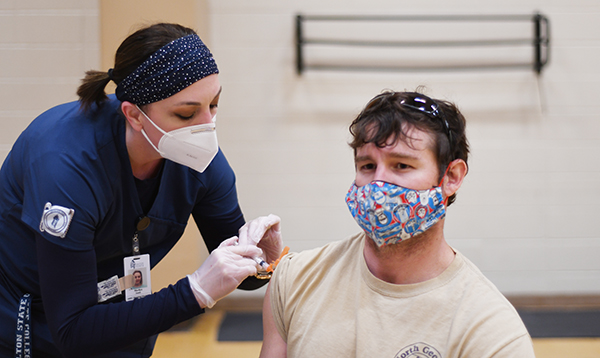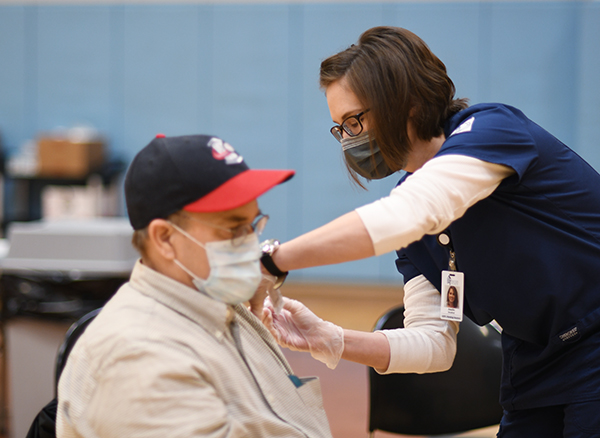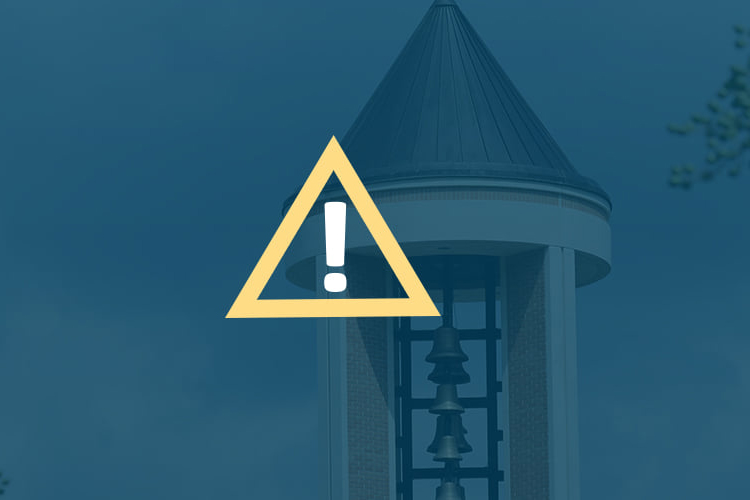Juggling the demands of being in a nursing program during a pandemic hasn’t been easy, but for Savannah Viars, the hands-on, front-line experience of the last year has instilled confidence.
“Now, I feel like I’m legit prepared for anything,” said Viars, who graduates in May with her Associate of Science in Nursing (ASN) from Dalton State. “During our clinicals in the hospital, they’re telling us we’re coming into nursing at the hardest time, but I don’t know anything else. So, I say, ‘Bring it!’”
Viars recently helped administer the COVID-19 vaccine for the Murray County Health Department. Nursing students, associate in nursing (ASN) and licensed practical nursing (LPN), have assisted the North Georgia Health District in both Whitfield and Murray counties with the vaccination. Students have also assisted with vaccines in Gilmer and Pickens counties.
“The students, faculty and staff in the School of Health Professions strive to be of service to our local community,” said Dr. Gina Kertulis-Tartar, dean of the school. “Assisting with the dispensing of vaccines is a natural way for our students to be of service and assist our community during the pandemic. It’s also a valuable learning opportunity for our students to experience a public health crisis.”
The partnership benefits Dalton State nursing students as well as the health departments and the community as a whole.
“This partnership allows us to distribute the vaccine to the public quicker,” said Debbie Pearson, county nurse manager for the Murray County Health Department. “We are a small health department with a small staff, but with the help of Dalton State’s students we are able to administer about 200-250 vaccines a day. Plus, these students are seeing the work public health does and are educating patients on the vaccine.”
Students also are helping with logistics. They’ve seen how a community recreation department is transformed into a distribution site, for example.
“We are getting hands-on experience, not just with giving immunizations but with talking to patients,” said Jennifer Swinford, an associate of nursing student expected to graduate in May. “There have been times this pandemic has been frustrating because we don’t know what to expect. It’s a blessing to be part of the pandemic response and to be helping with the vaccines.”

Though health officials have practiced pandemic drills for years, this is the first time many have had to put a plan into action.
“I hope this is a once in a lifetime experience, and they never have to endure a pandemic again,” said Jennifer Parker, assistant professor of nursing and director of the LPN program. “The opportunity for them to experience this is a valuable learning experience, which will help them in their career. Not only are they learning how to deal with a pandemic, but they’re learning how to be flexible, how to protect citizens in the community and the importance of public health in our communities. I also hope they learn what an important role they are playing in this pandemic.”
Anayelli Rosas, an ASN student, got a better understanding of the community she hopes to serve when she graduates in May.
“It’s important to be aware of the diverse group of people you are serving in your community,” she said. “There were people from all walks of life that came in to receive the vaccine. The sense of community helped me realize I am helping a lot more people than I realize. Being at the vaccine sites allowed me time to practice important interpersonal skills that as a future nurse, I will need to give the best patient care.”




